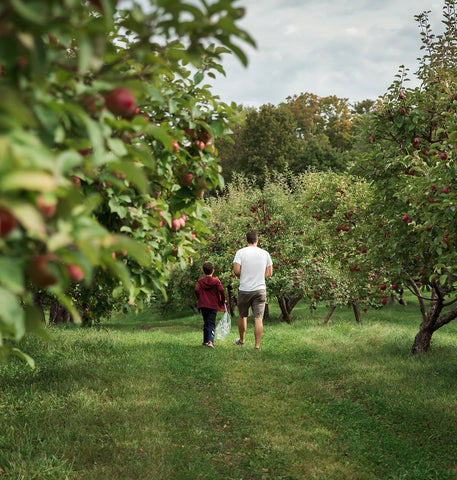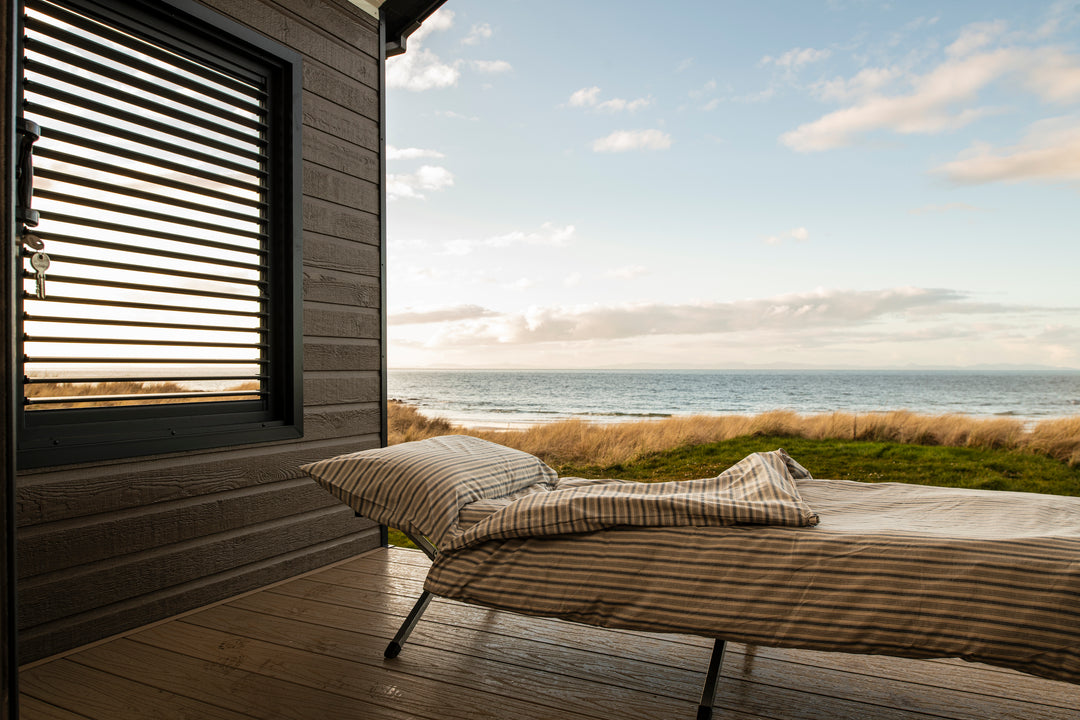Aligned with Ava Innes’ belief in sustainability, hear from Isabella about her expertise and key priorities in this newly appointed role.
We are delighted to welcome Isabella Guerrini de Claire to the Ava Innes team, joining us as our first Sustainability Officer. Isabella will be helping us to formalise the work we are doing around sustainability, ethical sourcing, and lowering our carbon footprint. She’ll also be driving our application for B Corp status.
This is a huge milestone for Ava Innes. As a small business, caring about people and the planet is at the core of the decisions we make.
Why do we want to support our sustainability claims? Because it is crucial. In today's landscape, there is a significant amount of greenwashing happening, where companies make false or exaggerated claims about their environmental practices. We want to provide our customers with a sense of assurance and peace of mind by backing up our sustainability claims with concrete evidence and data. With Isabella’s support, we’re able to run where previously we were walking – meaning we can make progress faster.
Over a remarkable period of 25 years, Isabella has amassed an extensive wealth of expertise in the fields of sustainability, climate innovation, and circular economy. She is a passionate proponent of restorative practices. And we couldn’t be more thrilled to have her.
Get to know the powerhouse supporting our sustainable goals for 2024, and beyond...
What led you to becoming a regenerative sustainability expert?
Isabella: My deep connection to the land and desire to make a positive impact. I was heavily influenced by the fact that my family owns Castello del Sole, an organic farm in Umbria, Italy, for which I had the privilege of facilitating the certification of its organic practices. Over time, I developed an increasing passion for transitioning our farm to regenerative organic agriculture. This invaluable experience allowed me to witness the profound impact of regenerative practices firsthand. As a result, my commitment to promoting regenerative sustainability has only grown stronger. After completing my academic path, I have actively engaged with the emerging global stage of the ‘Blue Economy’, spearheaded by Gunter Pauli, and have become involved with the ‘Schools of Thinking of Circular Economy’ narrative, as promoted by the Ellen MacArthur Foundation.

A deep connection to land and nature: Castello del Sole, Isabella's family farm in Italy
It's becoming overwhelming to decipher what is green-washing and what is not. What should we be looking out for?
Isabella: I entirely agree that it’s becoming increasingly challenging for people to distinguish between genuine sustainable products and those that are merely greenwashing. To make informed decisions when purchasing new items, there are three basic principles to keep in mind.
- Transparency: Look for clear and honest information about the product's environmental impact. This includes details about the materials used, manufacturing processes, and any certifications or eco-labels that validate its sustainability claims.
- Life Cycle Assessment: Consider the entire life cycle of the product, from raw material extraction to disposal. Assess its environmental impact at each stage, including its energy consumption, carbon emissions, and waste generation. Opt for products that have a minimal ecological footprint throughout their life cycle.
- Third-Party Verification: Seek products that have been independently verified by reputable organisations. Look for certifications from recognised entities that have rigorous standards for sustainability, such as B-Corp or Forest Stewardship Council (FSC). These third-party verifications ensure that the product meets specific environmental criteria and is not simply relying on vague or misleading claims.
By making informed choices, we can collectively drive the demand for genuinely sustainable products and contribute to a more environmentally conscious future.
Eco-anxiety is real, with so much bad news about our environment. It’s easy to feel powerless as to what we can do to fix the world. Are you able to tell us some good news about the work being done to change the ways businesses operate?
Isabella: As consumers, we possess a great power to change the world through our shopping choices and habits. There is an African proverb that offers timeless wisdom in this matter. "A falling tree makes more noise than a growing forest." It is a powerful suggestion that encourages us to contemplate the notion that the loudest events are not necessarily the most significant ones. Truly essential matters often unfold quietly, withstanding indifference and developing gradually over time. It serves as a reminder to focus not only on the grand gestures or prominent occurrences but also on the smaller, subtler elements that hold immense importance. Numerous positive initiatives and advancements are being made to transform the way businesses operate, with a strong focus on promoting sustainability and protecting the environment.
One particularly exciting development is the growing trend of companies integrating sustainability into their core operations and long-term strategies. This means that businesses are actively seeking ways to minimise their environmental impact and conserve resources. They are adopting more transparency and disclosure of their supply chains, implementing innovative practices such as waste reduction, the implementation of energy-efficient technologies, and sourcing materials from sustainable suppliers.
The rise of artificial intelligence (AI) and data-driven platforms will also revolutionise the way businesses operate. These platforms provide companies with valuable insights and analytics, enabling them to make informed decisions that prioritise sustainability. By leveraging data, businesses can identify areas of improvement, monitor their carbon footprint, and implement targeted solutions to reduce their environmental impact.
It is truly inspiring to witness the collective efforts of businesses and individuals who are dedicated to making a positive difference. By working together, we can ensure a brighter future for our planet and alleviate the feelings of eco-anxiety that plague us. So, let us take solace in the fact that progress is being made, and there is hope for a more sustainable and compassionate world.
What are your key priorities this year for Ava Innes? What are the core projects you will be working on?
Isabella: Ava Innes is deeply committed to driving positive change and fostering innovation in the business landscape, with a particular emphasis on promoting sustainability and safeguarding the environment. I had the privilege of meeting Joan many years ago, before she embarked on founding Ava Innes. Since then, I have had the honour of serving as her mentor throughout her remarkable journey at the Climate-KIC accelerator platform at the University of Edinburgh, where she distinguished herself in shaping her business.
Joan has been actively exploring various initiatives to minimise the environmental footprint of Ava Innes and preserve valuable resources. Ava Innes has already implemented innovative practices, such as waste reduction, the adoption of energy-efficient technologies, and the sourcing of materials from sustainable suppliers. My role is to validate her vision and narrative, ensuring that we are operating in alignment with our sustainability goals.
At Ava Innes, we place great emphasis on integrating sustainability into our long-term strategies. To achieve this, we are actively raising awareness among our staff and cultivating a shared understanding of the importance of sustainability. With my guidance, we intend to implement comprehensive ‘common language’ training programs on the carbon footprint for all stakeholders involved.
What resources do you recommend for learning more about sustainable practices and ways of living?
Isabella: Two notable authors to consider are James Lovelock and Paul Hawken. Films like ‘Breaking Boundaries’ and ‘Seaspiracy’ are excellent choices that shed light on pressing environmental issues. But I’d also say one of our greatest teachers is nature. Take time to connect with nature, appreciating its beauty, and understand our interdependence with the environment. It is the biggest motivator for us to make positive changes.
And last but not least, as you share our love of nature – where is your favourite natural place, and why?
Isabella: This is so difficult. There are numerous breathtaking places that have left a lasting impact on my heart, and one of these places is Scotland. However, there is another destination that holds a special place in my soul. And that’s the Dolomites, in the Siusi Valley. This majestic mountain range is characterised by towering peaks, rugged cliffs, and awe-inspiring landscapes. It is truly a paradise. What sets it apart is not only its natural splendour but also the deep sense of mindfulness towards the environment that is embedded in its essence. The local community holds a profound appreciation for nature and is dedicated to sustainable practices, which resonates deeply with me. Witnessing the harmonious coexistence between humans and nature in the Dolomites is both humbling and inspiring. It serves as a reminder of the magnificence, serenity, and limitless capacity of the natural world to rejuvenate the human spirit.

Harmonious coexistence: Siusi Valley
Read more Journal entries on sustainability, here.







